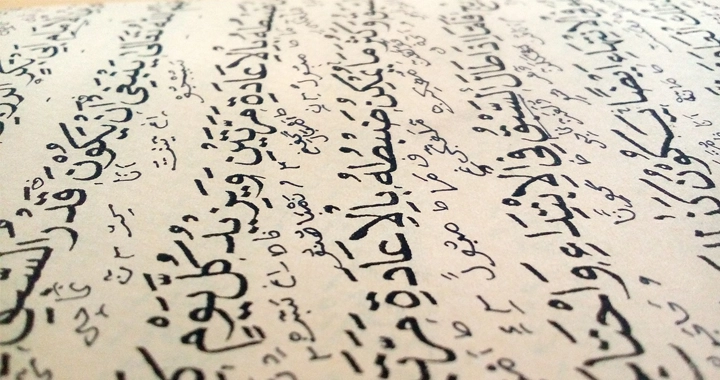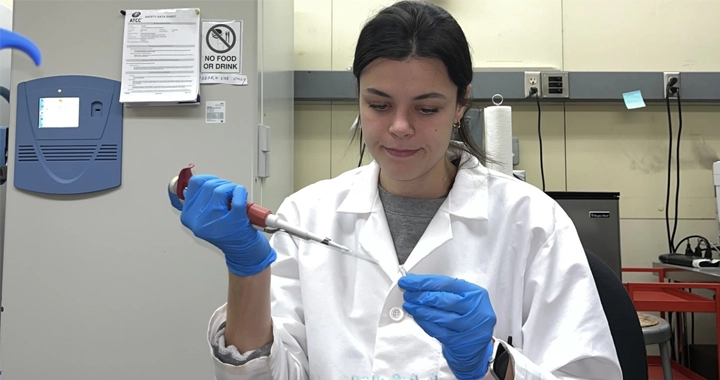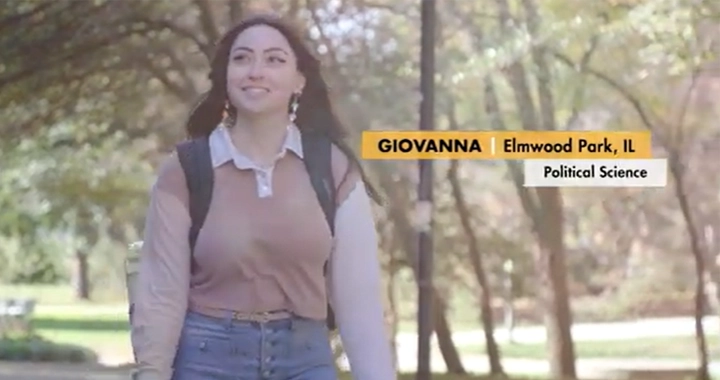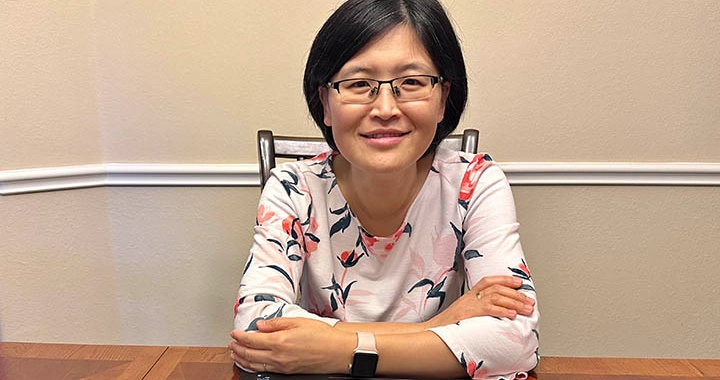Volume 14, Number 2
Featured Stories
- UWM Arabic program provides opportunity and community for all levels of learnersAre you interested in an exciting career in the foreign service or international business? Do you want to gain a better understanding of world politics and religion? Do you want …
- Undergraduate researcher works to pinpoint the cause of chronic fatigue syndromeChronic fatigue syndrome is not well understood, though the Centers for Disease Control estimates that up to 2.5 million Americans are living with CFS. The syndrome is characterized by “post-exercise …
- Video Story – Giovanna Found Independence and Security at UWMAs soon as Giovanna made the trip from her home in a suburb of Chicago to tour UWM’s campus, she knew she belonged there. “I loved the look of campus …
- UWM biologist awarded $2.4 million for an antibiotic alternative for treating crop diseasesA UWM faculty researcher has been awarded two federal grants, totaling $2.4 million, to further study of a compound he sourced from a bacterium that shows promise for controlling some …
- Why public health campaigns about opioid misuse work – or don’tYoung people aged 15-24 have experienced the greatest percentage increase in opioid overdose deaths in recent years. Yet the same age group is often resistant to the influence of public …
- On the Bears beat: UWM alum shines as Chicago sports journalistAs a Wisconsin native who was raised on Packers football, Kaitlin Sharkey is working in the heart of enemy territory. Sharkey is a sports reporter and anchor for WGN TV …
Alumni Accomplishments
- Samuel E. Liebert (’23, Masters of Public Administration) was named one of Wisconsin’s 51 Most Influential Black Leaders of 2023 by Madison365.com. Liebert is the Wisconsin State Director for the nonpartisan, nonprofit organization All Voting is Local, which seeks to dismantle barriers to the ballot box. Liebert has also served on the Janesville City Council and in administrative roles in other municipalities, and worked as the White House Liaison to the Department of Agriculture during the Obama administration.
- Brice D. Smith (’04, MA English; ’10, PhD History) received a $149,969 grant from the National Endowment for the Humanities for his work on the “House of History Project: Black LGBTQ+ Survivors and Thrivers in Milwaukee.” The project records oral histories about Black members of the city’s LGBTQ+ community and includes discussions about the HIV/AIDS and COVID-19 pandemics. The grant was awarded through Diverse And Resilient, a local LGBTQ+ advocacy group. Congresswoman Gwen Moore lauded Smith’s efforts.
- Gour Gobinda Goswami (‘03, PhD Economics) was appointed Pro Vice-Chancellor at Uttara University in Bangladesh in January by the president of Bangladesh and the Vice Chancellor at Uttara University. Most recently, Goswami was a faculty member at Bangladesh’s North South University. Goswami brings more than 30 years of teaching and research experience to his new role.
- Timothy Jarome (’13, PhD Psychology) received Virginia’s highest honor for a faculty member across their public university system – a 2024 Outstanding Faculty Awards from the State Council of Higher Education for Virginia. Professor Jarome is a neuroscientist at Virginia Tech’s School of Animal Science where his internationally recognized research program explores the molecular mechanisms in the brain related to fear-based memory formation such as PTSD.
- Ghassan Zeineddine’s (‘16, PhD English) book, Dearborn, was designated among “5 Wisconsin Books to Read this Winter” by Milwaukee Magazine. The book is a collection of short stories exploring the lives of the Arab American community in Dearborn, Michigan, where over half of the population is Middle Eastern. This is Zeineddine’s debut work.
- Several Letters & Science alumni were named among the Milwaukee Business Journal’s list of “Top 100 Power Brokers in Milwaukee” for 2024. They include Wendy Baumann (’84 BA Clinical Psychology, ’94 MS Exceptional Education), Wisconsin Women’s Business Initiative Corp; Emily Phillips (’07 BA History and Sociology), Robert W. Baird & Co; Marcelia Nicholson (’14 BA Communication), Milwaukee County Board; Clifton Phelps (’07 MPA Public Administration), JCP Construction; and Gale Klappa (’72 BA Communication), Wisconsin Energy Group. For a complete list of UWM alumni and administrators who were named to the list, visit the UWM Report website.
- John Katzka (‘68 BA International Studies) published a piece on American Diplomacy, a website for U.S. foreign affairs practitioners and scholars. He provided commentary on Russian propaganda efforts based on his 35-year career as a foreign service officer in Bangkok, Moscow, Lusaka, Belgrade, and Bucharest. Katzka is now retired from his service.
- Jen Gerber (‘03 BA History) is the new executive director of the Cedarburg Art Museum effective January 2024. Her previous experience includes library administration for Ozaukee County, and she teaches online nonprofit management courses for the University of Alabama.
Laurels and Accolades
Derek Handley (English) and Anne Bonds (Geography) were awarded a $147,412 grant from the National Endowment for the Humanities for their project “Mapping Racism and Resistance in Milwaukee County (MRR-MKE).” MRR-MKE looks at the history of racially restrictive housing covenants in metro Milwaukee. Their efforts received praise from Congresswoman Gwen Moore, who represents Wisconsin’s 4th district which includes Milwaukee, and was acknowledged in the Milwaukee Journal Sentinel and the Wisconsin Examiner.
PhD student Danielle Harms (English) was named the director of letters of The Wisconsin Academy of Sciences, Arts & Letters. Her responsibilities include serving as editor of the academy’s signature publication, Wisconsin People & Ideas (WP&I) magazine, leading the WP&I Poetry & Fiction Contest, and finding new ways to drive engagement in Wisconsin’s literary community.
In the Media and Around the Community
Jeffrey Sommers (African and African Diaspora Studies) wrote an op-ed for the Milwaukee Journal Sentinel on Wisconsin’s Act 10.
Bettina Arnold (Anthropology) was quoted in Nature following the discovery of the first known cases of chromosomal disorders in ancient DNA from human bones. The discovery sheds light on the perception and treatment of disabled individuals in ancient society.
Metropolis Magazine highlighted the work of Ryan Holifield (Geography) in starting the WaterMarks Initiative, which seeks to educate city residents about clean water stewardship through the use of lighted signs, art, and science outreach.
Increasing marijuana legalization even marginally may open new doors for academic research on the effects of cannabis, Krista Lisdahl (Psychology) told Fox 6 News.
Derek Handley (English) spoke at the Waukesha Public Library in January at an event titled, “Mapping Racism and Resistance: Struggles over Racism and Real Estate in the Urban North.” Handley spoke about the Mapping Racism and Resistance research project he is undertaking with UWM geography professor Anne Bonds. The event was part of a series honoring Martin Luther King, Jr. Day.
Carvd N Stone is a media outlet focused on highlighting positive news in Milwaukee and around the world. Blueprint365 profiled the company and its founder, Nyesha Stone (’18, BA Journalism, Advertising, & Media Studies).
The deep polarization in America has bolstered support for Donald Trump’s candidacy for the Republic nomination for president, Kathleen Dolan (Political Science) told Wisconsin Examiner in an article examining the former president’s legal troubles. She also analyzed the Biden’s administration’s frequent trips to Wisconsin and spoke about Vice President Kamala Harris’ recent visit for Spectrum 1 News.
Tenure allows professors the freedom to tell unpopular truths, Patrick Bellgarde-Smith (emeritus African & African Diaspora Studies) argued in an op-ed defending the practice that was published in the Milwaukee Journal Sentinel.
The Great Lakes hold secrets of ancient civilizations submerged in their waters. Ashley Lemke (Anthropology) spoke to Atlas Obscura about the formation of the lakes and the early hunter-gatherers who lived alongside them. On Interlochen Public Radio, she spoke about using artificial intelligence to simulate the movements of ancient caribou in order to track where ancient civilizations may have been. That piece was republished on ScienceFriday.com.
Emily Latch (Biological Sciences) was interviewed by the Larry Meiller Show on Wisconsin Public Radio about her research on badger ecology and genetics.
Why do so many people find themselves drawn to true crime stories? Because “evil tends to fascinate us,” Stacey Nye (Psychology) said in the Madison Area Technical College’s student newspaper, The Clarion.
Liam Callanan’s (English) 2023 novel, When in Rome, was reviewed in America Magazine. The analysis examines how Callanan’s work explores themes of religious discernment.
Arijit Sen (History) is one of the co-curators of the “Growing Resistance – Untold Stories of Milwaukee’s Community Guardians” exhibit at the Milwaukee Institute of Art & Design’s Brook Stevens Gallery. WUWM Radio profiled the work.
The Milwaukee Journal Sentinel reported on how Darian Dixon (‘15, BS Geosciences), who is working toward his PhD in Geosciences at UW-Milwaukee, created an internship program for local students.
After a semester working on their Storycart project examining Milwaukeeans’ relationship with food, students in the Center for 21st Century Studies program turned their work over to local artists to create the “Milwaukee Food Journeys” exhibit on display at the Milwaukee Winter Farmers Market. WUWM Radio reported the story.
People in Print
Ashley A. Huggins, C. Lexi Baird, … Christine Larson (Psychology), et al. 2024. Smaller total and subregional cerebellar volumes in posttraumatic stress disorder: a mega-analysis by the ENIGMA-PGC PTSD workgroup. Molecular Psychiatry. Online.
Michael Stoneman (Physics), Victoria McCoy (Geosciences), Carol T. Gee, Katherine M.M. Bober (Geosciences), and Valerica Raicu (Physics). 2024. Two-photon excitation fluorescence microspectroscopy protocols for examine fluorophores in fossil plants. Communications Biology, 7, 53. Online.
Rachel Bloom-Pojar (English) has co-authored “Preparing Publicly Engaged Scholars: A Guide for Innovation in Doctoral Education,” a new report from the American Council of Learned Societies. The report draws on the experiences of Mellon/ACLS Scholars and Society faculty fellows and graduate students to offer insights and recommendations for publicly engaged doctoral education. Each chapter addresses key gaps in doctoral education and explores new approaches to curriculum and programming that can be responsive to the ambitions of current and future advanced degree students in the humanities. Ideas include introducing graduate students to career pathways beyond the academy, collaborative archival research with community partners, and incorporating land-based pedagogy in connecting and supporting Indigenous students.





